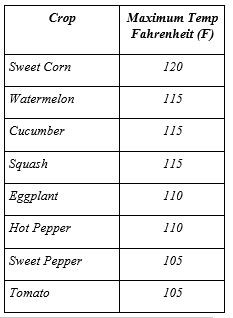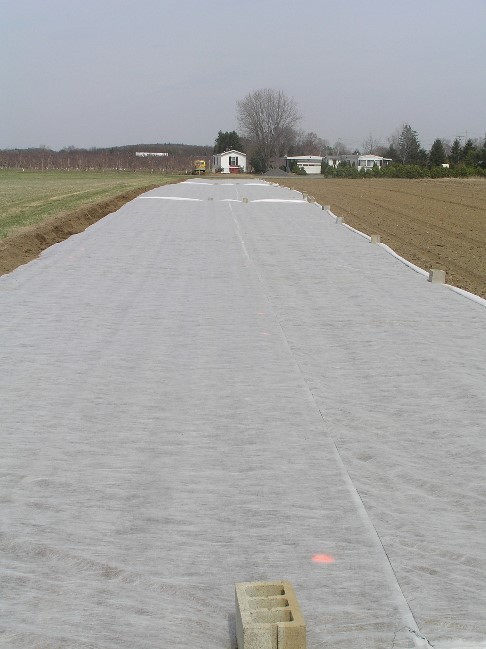Watch Those Temperatures
Chuck Bornt, Team Leader, Extension Vegetable Specialist
Eastern New York Commercial Horticulture
Just another reminder that even though we haven't reached really concerning temperatures yet, temperatures in high tunnels, crops under rowcovers or especially those under clear plastic hoops (such as sweet corn) can get very hot on these gorgeous bright sunny days! For sweet corn, the larger the plant under that plastic the greater the risk of injury is. If it gets too hot under that plastic, consider piercing the plastic with a pitchfork or setting up and running the irrigation to cool the soil and plastic. If it looks like we are in for a long warm stretch, you might consider slitting the plastic and removing it altogether. The one benefit of using floating rowcovers on sweet corn compared to plastic is you don't have to worry about it getting too hot as the rowcovers naturally breathe and are cooler. The following information is from Dr. Steve Reiners of Cornell University Department of Horticultural Sciences and can be used as a guide to know when to remove covers before it's too late!
"Most of the published temperature guidelines list maximum temperatures at which either vegetative growth becomes limited or reproductive capabilities are threatened, i.e. flowers or fruit fall off. Temperatures at which vegetable plants may die varies and depends not only on the vegetable type but also on other factors such as whether irrigation is being provided or for how long the high temperature occurs. Also, a transplant will be under much greater stress than a plant that is direct seeded.
The following table lists temperatures at which severe stress will occur, possibly death, especially if soil moisture is low. These temperatures refer only to potential crop death. Temperatures 15 to 20F lower than those listed in the table will result in the loss of flowers and fruit and will negate the positive effects of early warming under row covers."
 Chart with various vegetables
Chart with various vegetables Row cover
Row cover
Upcoming Events
2026 Northeast Extension Fruit Consortium Winter Webinar Series
February 4, 2026 : Management of Up and Coming Strawberry Diseases in the Northeastern United States
Session 1: Management of Up and Coming Strawberry Diseases in the Northeastern United States
February 11, 2026 : Kiwiberry Production in the Northeast
Session 2: Kiwiberry Production in the Northeast
February 18, 2026 : Heat Mitigation- Sunburn and Fruit Coloring
Session 3: Heat Mitigation- Sunburn and Fruit Coloring
February 25, 2026 : The Dating Game- Updates in Lepidopteran Mating Disruption
Session 4: The Dating Game- Updates in Lepidopteran Mating Disruption
March 4, 2026 : USEPA Endangered Species Act Strategies and Pesticide Use
Session 5: USEPA Endangered Species Act Strategies and Pesticide Use
March 11, 2026 : Practical Drought Management for Fruit Growers
Session 6: Practical Drought Management for Fruit Growers
Managing the Invasive Swede Midge Webinar
March 6, 2026 : Managing the Invasive Swede Midge Webinar
Swede midge is an invasive fly that causes serious economic losses to brassica crops. Due to its small size and hidden feeding habits, swede midge is often called an "invisible pest" and damage may be misdiagnosed. In this webinar, we will review the swede midge life cycle and crop damage symptoms, current management recommendations, new research findings, and highlights from on-farm case studies with a focus on organic management.
New Farm Manager Skills Day - Get the Tools You Need to Grow Your People (Hudson Valley)
March 10, 2026 : New Farm Manager Skills Day - Get the Tools You Need to Grow Your People
Millbrook, NY
Are you moving into a supervisory farm management role this season and want to get off to a good start? Are you an experienced manager who wants to connect with other "people" managers and work on your skills? This one-day workshop is for you!












































